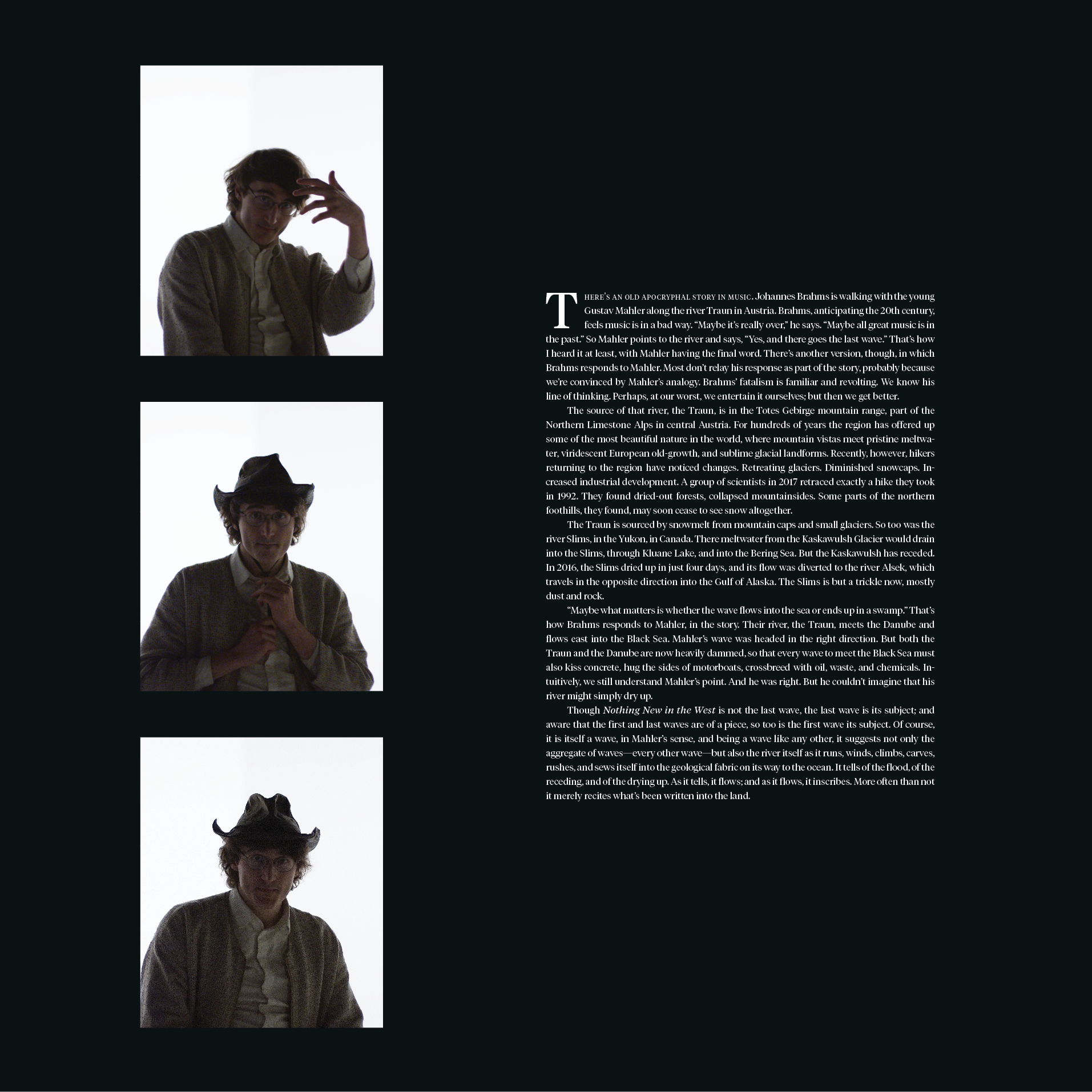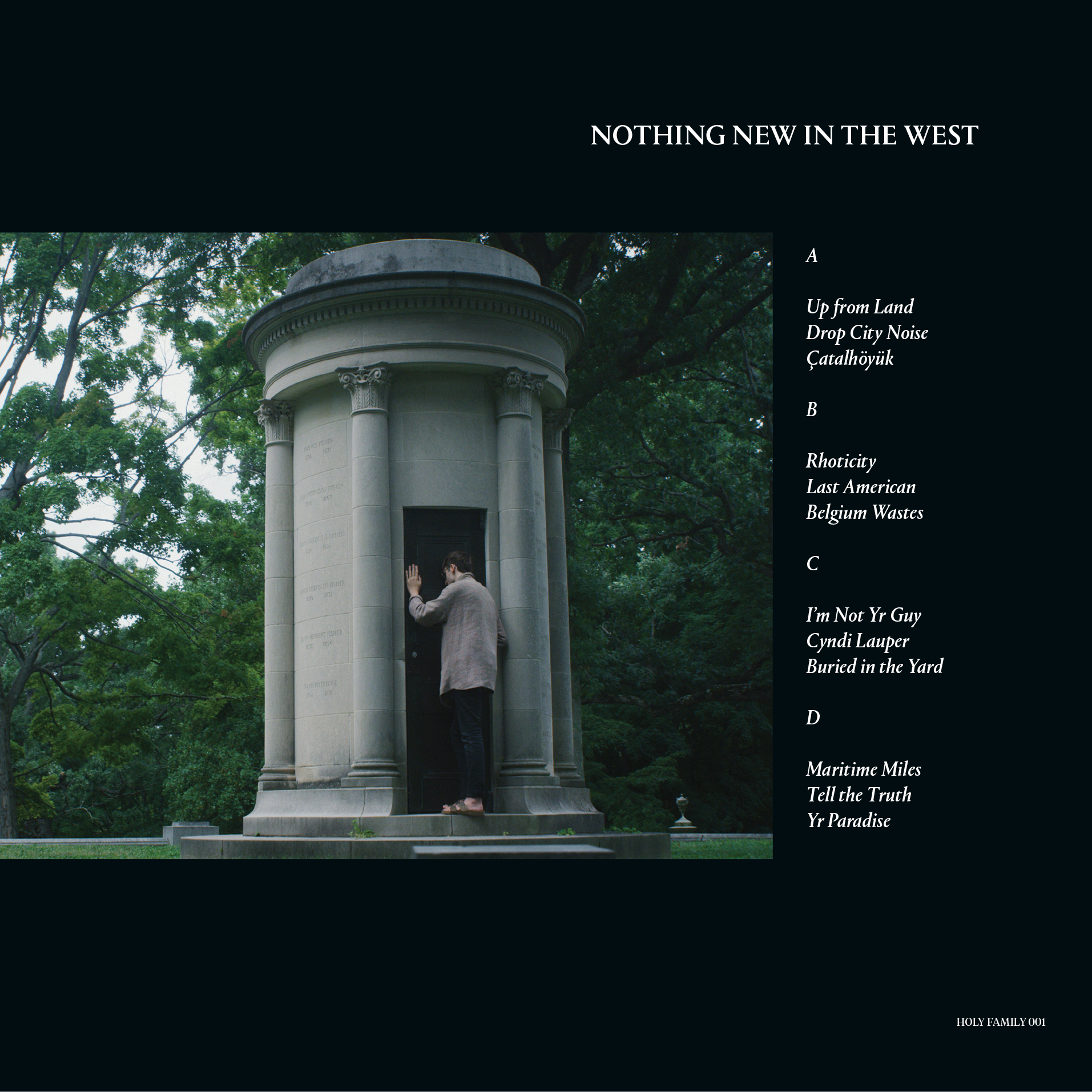



















Nothing New in the West, the first LP by J. Mamana, weaves an encyclopedic array of references, from Neolithic burial practices to the early Church Fathers to hydropower in the American West, into a Boschian vision of personal and civilizational decline.
Recorded with his friend and collaborator Seth Manchester (Tyondai Braxton, Olga Bell) at Machines with Magnets in Pawtucket, RI, the music mirrors the scope and intensity of the lyrics with swirling chamber arrangements that ornament his songs like the cornices of a Gothic cathedral. It was mastered by Heba Kadry (Björk, Zola Jesus) at Timeless Mastering.
Its first single, “Tell the Truth”, is built on a sample of Emahoy Tsegue-Maryam Guebrou. Machaut-like vocal harmonies spiral around Emahoy’s piano before merging with a boom-bap beat and a string quartet arrangement inspired by Beethoven’s “Heiliger Dankesang.”
Watch the video for “Tell the Truth.”
After graduating from Brown in 2016, Mamana moved into a small farmhouse in Providence, R.I. to set up a studio. There he worked for two years on what would become his debut record, Nothing New in the West.
“I spent much of my time alone, recording in a tiny room attached to this 18th century gambrel-roofed house,” J. explains. “I mostly interacted with my septuagenarian landlords, Jim and Nancy, who were kind about the fact that I played the drums so much.”
During this time, J. taught himself the arcane art of engineering, recording in his apartment everything from drum kit to modular synth to french horn. He bolstered his knowledge of harmony and counterpoint by studying the theoretical works of Arnold Schoenberg. Aside from that, he read widely (and indiscriminately) in medieval history, Christian theology, environmental science, and cybernetics, among other things.
Watch the video for “I’m Not Yr Guy.”
“I pulled the lyric references from books I found, like Helen Waddell’s Wandering Scholars, which is about these Christian poets who would serve black pudding at communion and tell dirty jokes at the pulpit and stuff,” J. says. “They aestheticized their version of the ‘dominant culture’ and satirized it. But also they were the dominant culture. They were rich landowners. I wanted to write characters who were like the goliards, because I felt I knew them.”
These themes are depicted in comic set-pieces which detail the disparate, desperate psyches of J.'s characters. Take second single “Last American.” It begins with a dejected wanderer's stream of consciousness:
There's no one in Hollywood who could possibly play my father
So I no longer go to the movies
I don't see anymore movies at all
Later our protagonist wanders into a Manhattan movie theater, where he yells at the screen for answers. When there are none, he returns to his apocalyptic refrain:
To the last American to call out the names of every crumbling monument:
Did you ask for it?
Watch the video for "Last American."
“What connects the goliards to the Church Fathers to the American foreign policy establishment to the climate alarmists is an eschatological worldview,” J. adds. “It's increasingly hard to think they won't be proved right. I can't get over what sorry vindication that is.”
J. eventually went to Machines with Magnets expecting only to record grand piano. But Seth Manchester noticed that J. was making something unique, and urged J. to work with him at his studio to finish the record. J. more or less lived at the studio for three months in summer 2017.
Together they achieved a more sophisticated sound — still J.’s self-taught engineering and production, but grander than the usual self-recordist's fare. The result is a challenging, funny, deeply felt record, and one of the most accomplished and distinctive debut releases of the year.
